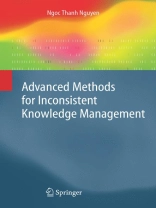Nowadays in the knowledge society, each member deals with a number of tasks related to knowledge management. The most often realized tasks are: decision making, knowledge integration, selection, and retrieval. In all these tasks one has to solve inconsistency of knowledge. Inconsistency is a feature of knowledge which is characterized by the lack of possibility for inference processes. Therefore, solving inconsistency of knowledge is a basic and very essential subtask in many tasks of knowledge management. The whole management process may become impossible if the incons- tency is not resolved. This book presents a set of methods for resolving inconsistency of kn- ledge. It originally treats the inconsistency on two levels, syntactic and semantic, and proposes methods for processing inconsistency on these levels. The methods proposed here are consensus based. They are worked out on the basis of mathematical models for representing inconsistency as well as tools for measuring and evaluating the degree of inconsistency, defined by the author. The presented material shows that the solution of inconsistency is str- gly related to knowledge integration processes. Therefore, along with – consistency resolution tools, the author proposes algorithms for knowledge integration, such as ontology integration, or agent knowledge states in- gration. The author has put across a deep and valuable analysis of the p- posed models by proving a number of interesting and useful theorems and remarks. Owing to these analysis results one can decide to use the worked out algorithms for concrete practical situations.
Tabela de Conteúdo
Inconsistency of Knowledge.- Model of Knowledge Conflict.- Consensus as a Tool for Conflict Solving.- Model for Knowledge Integration.- Processing Inconsistency on the Syntactic Level.- Processing Inconsistency on the Semantic Level.- Consensus for Fuzzy Conflict Profiles.- Processing Inconsistency of Expert Knowledge.- Ontology Integration.- Application of Inconsistency Resolution Methods in Intelligent Learning Systems.- Processing Inconsistency in Information Retrieval.- Conclusions.












